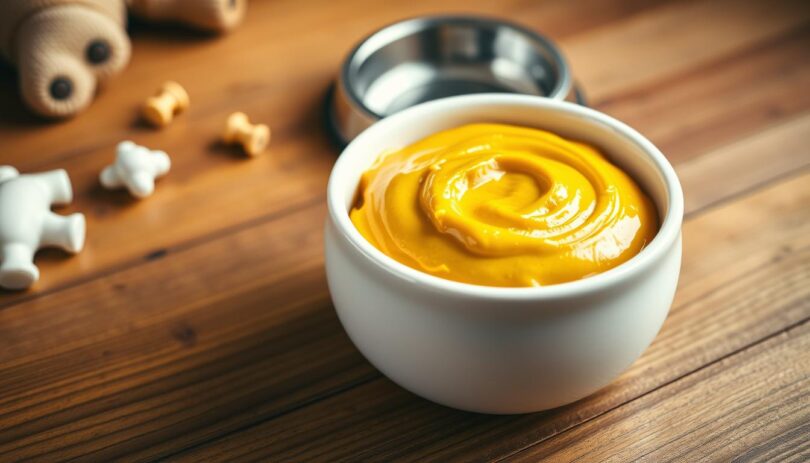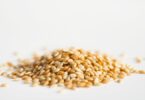Picture this: you’re enjoying a backyard barbecue, and your furry friend gazes up at your hot dog with hopeful eyes. It’s tempting to share a bite, but that yellow smear of mustard gives you pause. What seems harmless to humans might hide dangers for pets. Understanding what’s safe for your companion is part of being a responsible pet parent.
Mustard, a popular condiment in American households, adds zest to burgers and sandwiches. Yet, its ingredients—like spices, vinegar, and seeds—can upset a dog’s digestive system. While small amounts may not cause immediate harm, repeated exposure risks long-term health issues. Experts at Purina and other veterinary sources warn against feeding pets human condiments due to their unpredictable effects.
This article explores why this everyday topping isn’t ideal for canine companions. Topics include toxic components, symptoms of ingestion, and actionable steps if your pet accidentally consumes it. For deeper insights, explore our detailed guide crafted by pet nutrition specialists.
Knowledge empowers better choices. By learning the risks, you can protect your four-legged family member while still savoring your favorite meals guilt-free.
Understanding Mustard and Its Ingredients
Behind every spoonful of mustard lies a blend of components that could affect pets. While humans enjoy its tangy kick, the condiment’s makeup raises concerns for animals. Breaking down its elements helps explain why even small amounts may trigger adverse reactions.
The Role of Mustard Seeds in Toxicity
Mustard seeds contain compounds called isothiocyanates. These natural chemicals protect plants from pests but irritate a pet’s digestive lining. Processed varieties like yellow or dijon mustard retain these seeds, making them problematic.
Powdered forms concentrate the seeds’ potency. Homemade recipes often use raw seeds or mustard powder, increasing risks compared to store-bought versions. Even trace amounts can cause vomiting or diarrhea in sensitive animals.
Different Types and Their Hidden Risks
Honey mustard adds sugar and sweeteners, which may attract pets but worsen stomach upset. Dijon includes wine or vinegar, introducing acidic elements. Spicy brown types often mix horseradish, doubling irritation potential.
While wild mustard greens lack concentrated seeds, condiments always pose threats. Reading labels reveals additives like garlic or onion powder in some brands—ingredients toxic to pets on their own.
Understanding these differences helps owners avoid accidental exposure. Safer treat alternatives exist, ensuring pets enjoy snacks without compromising their health.
Can Dogs Have Mustard? Toxicity and Safety Concerns
The dangers lurking in common condiments might surprise pet parents. Even tiny quantities of mustard contain compounds that threaten animal health. Research shows these ingredients trigger reactions ranging from mild discomfort to severe gastrointestinal distress.
How Mustard Affects Your Dog's Digestive System
Mustard seeds release isothiocyanate when consumed. This compound irritates the stomach lining and intestinal tract. Inflammation often leads to vomiting, diarrhea, or loss of appetite within hours.
Pets might encounter this condiment by licking plates or snatching dropped food. A single hot dog with mustard coating poses risks. Repeated exposure increases the likelihood of chronic digestive issues.
Examining Harmful Compounds in Mustard
Studies confirm that higher concentrations of mustard seeds amplify toxicity. A pet consuming large amounts may experience dehydration from prolonged vomiting. Immediate veterinary care becomes critical in these cases.
Watch for symptoms like excessive drooling or abdominal pain. These signs indicate the body’s reaction to toxic elements. Quick action minimizes long-term harm and speeds recovery.
Knowledge about these risks helps owners create safer eating environments. Simple precautions prevent accidental ingestion while maintaining enjoyable family meals.
Recognizing Signs of Mustard Poisoning in Dogs
Canine companions can't verbalize discomfort, making symptom recognition vital. Physical changes like vomiting or lethargy often signal internal distress. Owners should watch closely for these red flags after accidental ingestion.
Common Symptoms to Watch For
Early signs include repeated vomiting and diarrhea—the body's attempt to expel irritants. Excessive drooling or stomach tenderness often follows. Some pets show abdominal pain through restlessness or a hunched posture.
Lethargy and refusal to eat may develop within hours. These symptoms indicate the digestive system struggles to process toxins. Persistent distress risks dehydration, especially in smaller animals.
When to Reach Out to Your Veterinarian
Contact your vet immediately if vomiting persists beyond two episodes. Blood in stool or extreme weakness requires urgent care. Provide details about the quantity consumed and symptom onset timing.
Professionals might recommend IV fluids or anti-nausea medications. Delaying intervention could worsen the canine's condition. Always err on the side of caution—early action improves recovery chances significantly.
Steps to Take If Your Dog Consumes Mustard
Accidental exposure happens despite precautions. Acting swiftly reduces risks and helps your companion recover faster. Start by assessing how much they ingested and which variety was involved.
Home Care and Monitoring Guidelines
Remove any remaining mustard from reach immediately. Offer fresh water to dilute stomach contents. Track behavior changes like pacing, whining, or refusal to eat.
Check for vomiting or diarrhea every 2-3 hours. Note the color and consistency. Mild symptoms might resolve within 24 hours with rest. Avoid giving food until their stomach settles.
Professional Veterinary Intervention and Advice
Contact a veterinarian if your pet ate mustard containing seeds or garlic additives. Share details about the quantity and type consumed. Severe reactions like blood in stool require emergency care.
Vets may induce vomiting or administer activated charcoal. IV fluids combat dehydration from prolonged sickness. Follow post-treatment dietary recommendations to restore gut health.
Prevention remains the best strategy. Store condiments securely and educate family members about pet-safe foods. Quick action paired with expert guidance ensures your furry friend stays protected.
Promoting Your Dog’s Health and Preventing Future Exposure
Keeping your pet safe starts with smart kitchen habits and informed choices. Store mustard and similar condiments in locked cabinets or high shelves. Replace table scraps with vet-approved snacks like plain cooked meats or vegetables. This reduces temptation while providing safe enrichment.
While honey-based sauces might seem safer, they often contain additives like garlic powder or excess sugar. Always check labels before sharing human foods. Prioritize pet-specific formulas that balance nutrition without hidden risks.
Even a small amount of harmful ingredients can lead to digestive distress. Schedule annual check-ups to discuss dietary needs and review treat options. Collaborate with your veterinarian to tailor a meal plan supporting long-term wellness.
Secure storage, mindful substitutions, and professional guidance form the foundation of prevention. For more tips, explore our trusted resources on pet-safe nutrition. Simple adjustments today safeguard your companion’s health tomorrow.
FAQ
Why is mustard considered unsafe for pets?
Mustard contains compounds like isothiocyanate, which irritate a canine’s digestive system. Seeds and certain additives in condiments like Dijon or honey mustard may also trigger vomiting, diarrhea, or stomach pain.
Which types of mustard pose the highest risk?
Mustard powder and whole seeds are most concentrated and toxic. Prepared varieties like honey mustard often include garlic, onion, or excess salt, increasing health risks for dogs.
Can a small lick of mustard harm my pet?
A tiny taste might only cause mild stomach upset. However, repeated exposure or larger amounts—especially from spicy or seasoned mustards—increase the likelihood of adverse reactions.
How should I respond if my dog eats mustard?
Remove any remaining food, offer water, and monitor closely. Call your vet or an animal poison control hotline for guidance, especially if symptoms develop or the quantity consumed was significant.










Leave a Comment